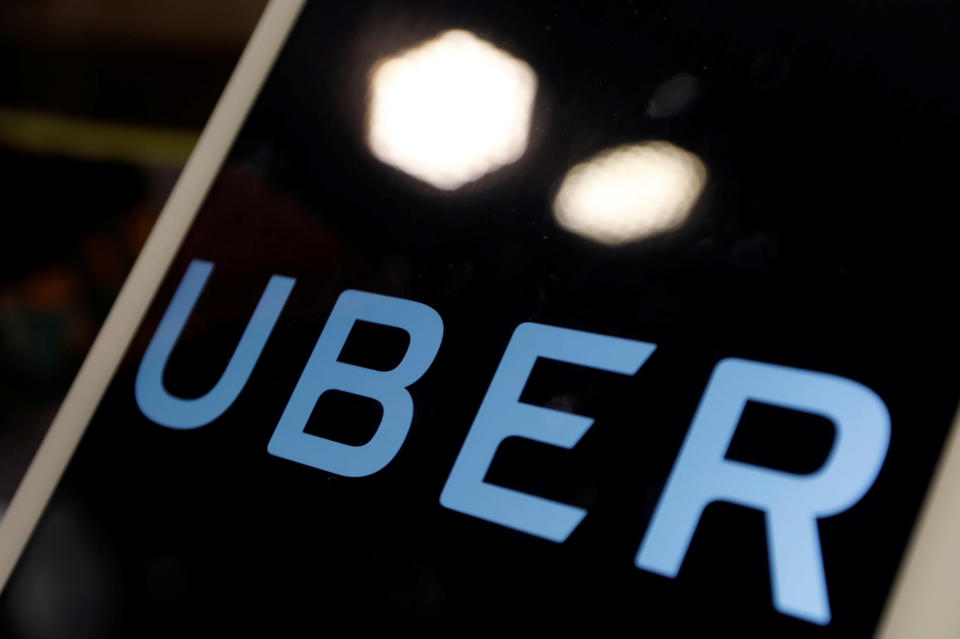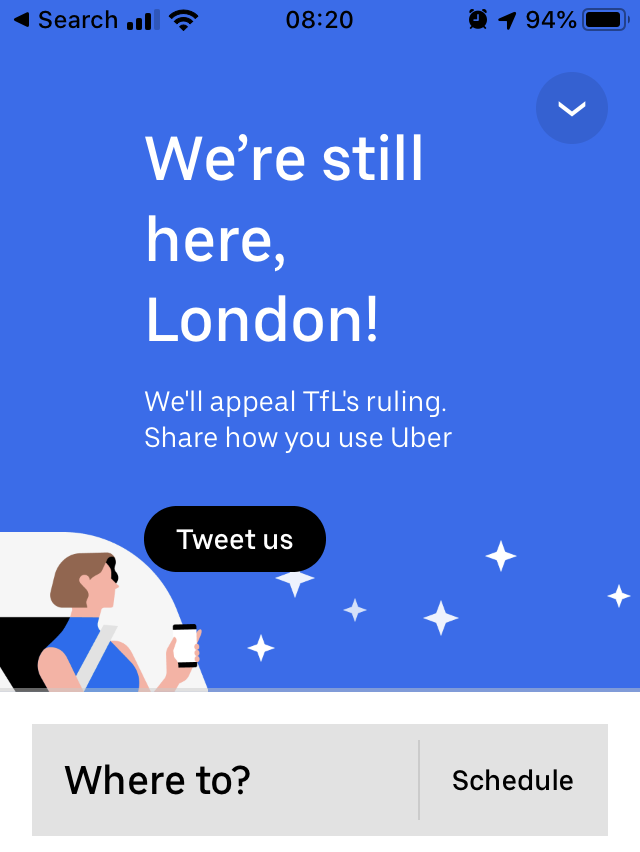What's next for Uber after London licence announcement?
Uber has begun its fightback against transport chiefs’ decision to strip it of its London licence, launching a battle on multiple fronts to avoid a ban in the UK capital.
The taxi app firm (UBER) is fighting to survive in one of its biggest global markets after Transport for London (TfL) discovered people pretending to be Uber drivers had fraudulently driven thousands of passengers.
The watchdog accused the firm of being too “easily manipulated” and putting “safety at risk,” warning it lacked confidence in Uber’s ability to prevent further safety issues in future.
But the decision is not the end of the road for Uber, with a previous ban in 2017 overturned by a judge. It can continue to operate for now, and is fighting to win hearts and minds as well as its legal battle.

The battle in the courts
Uber was quick out of the blocks after the ruling on Monday in releasing a statement vowing to appeal the decision. The appeal itself gives Uber the chance to see the issue ruled on by a magistrate rather than TfL.
It will be hoping for what it sees as a fairer, more independent verdict from the court. Its long-running stand-off with the London transport body has soured relations, with its chair and city mayor Sadiq Khan highly critical of Uber and under pressure to resist it from black cab drivers.
READ MORE: Why Uber lost its London licence again
Licensing rules mean it has three weeks to file an appeal, but the legal process itself could take months or even years. Another legal battle Uber is embroiled in over its drivers’ rights has dragged on for more than three years after multiple appeals by the firm.
That means it should not only be able to continue to operate for the foreseeable future as long as the appeal rumbles on, but also gives it time to try to address TfL’s concerns before the final ruling.
“We think it can get a favourable ruling in court,” said Ali Mogharabi, senior equity analyst at Morningstar. “We think the firm’s solutions could include more continuous background checks (which Uber began last year) and better methods to verify identity of drivers ... Uber has more than enough capital at hand to address these issues.”
The battle for public opinion

Uber appears to be planning to heap pressure on TfL and mayor Sadiq Khan to encourage them to overturn the decision, much as it launched a petition when a ban was first proposed in 2017. It has mounted similar campaigns in other cities around the world.
It took out a full-page advert on the backpage of London business newspaper City AM on Tuesday as it moves to reassure customers it is business as usual.
“We’re still here for the 3.5 million Londoners who rely on Uber to travel safely around the city, or make a living,” it read.
It has also been not only reassuring customers logging into its app—”We’re still here, London!”—but also urging them to “share how you use Uber” by tweeting to them.
READ MORE: Uber urges drivers to take out free insurance after row over employment rights
Its UK Twitter account is retweeting passengers’ stories, including customers who say it means they don’t need a car, disabled users unable to drive and workers getting home safely after night shifts.
It has also shared drivers’ messages, with one tweeting that his family and car loan rely on his Uber income, while the flexibility helped him to study law.
But the company has adopted a more conciliatory tone recently than when it first arrived in London, looking to soothe regulators’ concerns rather than ruffling feathers.
The mayor may face more vicious attacks from other quarters anyway. Some media commentators have condemned Khan’s “retrograde war” on Uber.
The issue could also become increasingly politicised with London’s mayoral elections next year, with Conservative mayoral candidate Shaun Bailey warning London’s open reputation “has taken a hammer blow.”
@UberUK thank you guys. I’m disabled and don’t drive, you guys help me keep my independence when I’m visiting my family
— Rachel McNally (@MissRaeMcNally) November 25, 2019
The battle for Uber’s market if it crashes out
There is no shortage of other companies nipping at Uber’s heels that would scramble to replace Uber if it ultimately crashed out of the London market.
“There would be competition that would fill that void quite quickly," Fiona Cincotta, a market analyst at City Index, told the BBC.
“With both Ola and ViaVan being offered licenses this year, this market and its operators are expanding, giving workers and customers more choice. If this decision by TfL is upheld, there will be a large gap in the market that these players will be racing to fill and a vast sum of drivers looking for other platforms to operate on,” said Nick Woodward, CEO of ETZ Payments.
The chief executive of rival taxi app firm Bolt recently told Yahoo Finance UK it was already benefiting from waning investor confidence in Uber, which has seen its share price slide significantly this year since it went public.
Markus Villig claimed his Estonia-based company, which operates in 35 countries, was more efficient than Uber and better value for both customers and drivers.
Meanwhile Kapten, a French app backed by Daimler and BMW, also has a London licence and has run extensive recent marketing campaigns in the city. It has directly attacked Uber over its taxes, presenting itself as an “ethical” alternative and declaring this week: “London doesn’t need Uber.”
But Uber is by far the biggest player, and seems unlikely to give up its London crown any time soon.
READ MORE: Uber and Lyft’s woes ‘supporting’ European rival Bolt

 Yahoo Finance
Yahoo Finance 